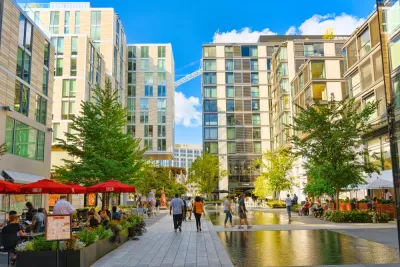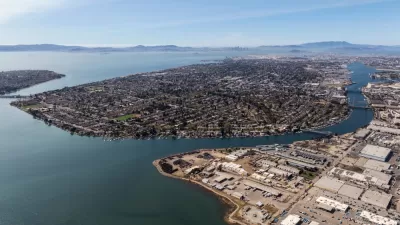The Region United Framework for 2030 outlines a plan for sustainable, equitable development, calling for a 'holistic' approach to regional planning.

Writing in Greater Greater Washington, Ethan Goffman reports on the Metropolitan Washington Council of Governments (COG)’s Region United Framework for 2030, a plan for the future development of the Washington, D.C. region that focuses on equity, transportation, housing, and climate and works to reduce sprawl.
According to Goffman, the updated framework reflects a more concerted focus on equity, the need for which was laid bare by the pandemic’s impact on the most vulnerable populations and essential workers. “While some planners advocated for including these workers before the pandemic, COVID’s disparate impact threw into sharp relief the need for a holistic view of sustainability and inclusion when planning built environments.”
The framework reflects growing support for transit oriented communities (TOC), an update on the traditional transit oriented development (TOD) that centers equity and includes a commitment to ensuring that low-income households aren’t priced out. The framework uses the COG’s Equity Emphasis Areas (EEAs) tool, which identifies “census tracts with high concentrations of low-income people and ‘traditionally disadvantaged racial and ethnic’ groups,” to target investments in transportation, housing, and climate resilience to the areas that need them most. “Beyond housing and transit, TOC requires a comfortable built environment, including safe street crossings, wide sidewalks, and vegetation.”
FULL STORY: How the region’s housing targets can support transit-oriented communities

Trump Administration Could Effectively End Housing Voucher Program
Federal officials are eyeing major cuts to the Section 8 program that helps millions of low-income households pay rent.

Planetizen Federal Action Tracker
A weekly monitor of how Trump’s orders and actions are impacting planners and planning in America.

Ken Jennings Launches Transit Web Series
The Jeopardy champ wants you to ride public transit.

California Invests Additional $5M in Electric School Buses
The state wants to electrify all of its school bus fleets by 2035.

Austin Launches $2M Homelessness Prevention Fund
A new grant program from the city’s Homeless Strategy Office will fund rental assistance and supportive services.

Alabama School Forestry Initiative Brings Trees to Schoolyards
Trees can improve physical and mental health for students and commnity members.
Urban Design for Planners 1: Software Tools
This six-course series explores essential urban design concepts using open source software and equips planners with the tools they need to participate fully in the urban design process.
Planning for Universal Design
Learn the tools for implementing Universal Design in planning regulations.
Ada County Highway District
Clanton & Associates, Inc.
Jessamine County Fiscal Court
Institute for Housing and Urban Development Studies (IHS)
City of Grandview
Harvard GSD Executive Education
Toledo-Lucas County Plan Commissions
Salt Lake City
NYU Wagner Graduate School of Public Service





























